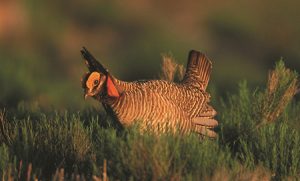
This weekend marks two major milestones in the sporting calendar. One sees hoards of noisy revellers dress up in peculiar garb, dust off their weapons and board trains up and down the country to go and unleash carnage on an unsuspecting foe. The other is the start of the Premier League season.
The former, of course, is The Glorious Twelfth – the opening day of the game shooting season. It’s not known who or what came up with that grandiose moniker but you can bet it wasn’t a red grouse. For this plump little game bird, the 12th August is anything but glorious. Having spent the previous eight months of the year frolicking carefree in the heather of Britain’s beautiful moorlands, working their way through their bucket lists (1. Learn to fly; 2. Peck at heather; 3. Mate…), they suddenly find themselves driven into a volley of gunfire, reminiscent of the first day of the Battle of the Somme (not that any of them would remember that).
Hundreds of thousands are gunned down and whisked off to the waiting tables of posh London restaurants, pausing only to be cooked and drizzled in a jus of some kind, possibly involving blackberries.
This has been a tradition since the Game Act of 1773 enforced a closed season on hunting, shooting and fishing in order to give game populations a bit of respite and a chance to mate without the prospect of being shot in the act. Britain had been gripped by something of a popular frenzy for shooting stuff and the Government of Lord North was quick to realise that if the people kept shooting stuff at their current rate there would soon be nothing left for them to shoot. Added to which, they needed the ammo for the impending revolution across the pond.
The bird most in need of protection in those days was the partridge, which was granted a three week stay of execution by the Game Act. For the privileged partridge, the honeymoon period ends on 1st September. Grouse, however, was deemed fair game from the Glorious Twelfth, along with its relation the Ptarmigan, because no-one was that keen on hunting them in 1773. Grouse are quicker and more jinky than partridge and, therefore, much harder to shoot, plus they all live miles out of town. But all that changed with the spread of the railways and the invention of the breech-loading shotgun in the mid-1800s. A game changer, you might say. With the railways now making it possible to get to the moors in a matter of hours rather than days and the shotgun loader able to reload faster than you could say “Duck!”, grouse became the number one game bird on the menu.
Ptarmigan. That’s not a word you hear every day, is it? And in fact, before the 17th century, you didn’t. You might have heard the perfectly sensible Gaelic word ‘tarmachan’ but then it fell into the hands of Greek scholars (that is scholars of Greek), who tended to live by the principle that there wasn’t a word beginning with T that couldn’t be improved by sticking a P on the front of it, and the ptongue-ptwisting ptarmigan was born.
The P is silent, as my old French teacher used to say, “as in bath”.
We use the word ‘game’ in many contexts. Fair game. I’m game. Fancy a game? It’s only a game. Game pie. The game’s up. The game’s afoot. Game leg… That’s right, game leg. Sometimes pronounced ‘gammy’ (and indeed often spelt that way too), a game leg is a lame leg (that’s lame as in limping, not lamé as in Liberace). Though it might be the kind of leg a grouse beater could find himself with after an unfortunate encounter with an overenthusiastic gunman, the game in game leg is not related to the rest of the gaming world. It’s believed to come from the old French ‘gambe’ for a leg (now ‘jambe’), from which we also get the verb to gambol.
All the other forms of game come from the Old English ‘gamen’, which had the sense of fun and play. It didn’t necessarily imply competition, any more than it does for young children today. A game of Doctors and Nurses, for example, is not competitive. Unless some precocious young doctor happens to put you on the imaginary waiting list for a kidney transplant.
But stout young medieval gamers quickly tired of games like backgammon, chess and lobbing quoits round the necks of geese and preferred to channel their testosterone into the thrill of the chase. And when they tired of that they went hunting. With hunting came competition and sporting prowess and thus the ‘game’ became ‘sport’.
At the end of his ‘Once more unto the breach, dear friends’ speech, Shakespeare’s Henry V says to his warriors:
I see you stand like greyhounds in the slips,
Straining upon the start. The game’s afoot:
Follow your spirit, and upon this charge
Cry ‘God for Harry, England and Saint George!’
The ‘game’ was now not just the act of hunting but the quarry itself. By the time Sherlock Holmes started using Shakespeare’s phrase, the sense had become ambiguous. By now we had football, rugby, cricket and golf and “The game’s afoot” could have been interpreted as “the quarry is on the move” or “the ref’s blown his whistle for the start of the match”. It doesn’t really matter; we all knew it was the cue for Watson to hand Holmes his deerstalker.
This year, after all that, the game will not be afoot on the Glorious Twelfth. The guns will remain silent, not because of a ceasefire brokered with the League Against Cruel Sports, but because it falls on a Sunday and the shooting of game is forbidden on Sundays and Christmas Day.
So… one more day to complete that bucket list, my feathered friends.


